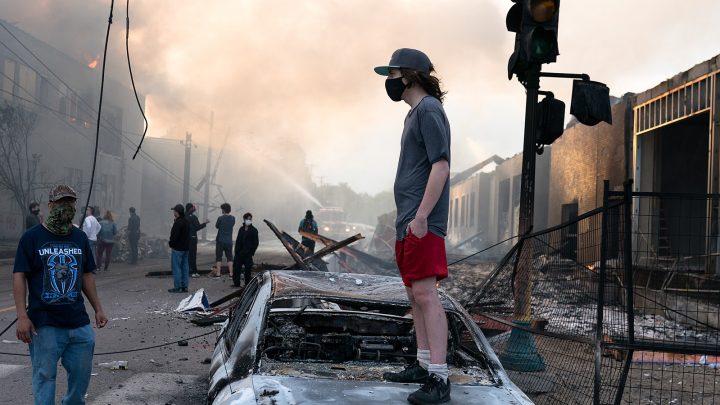
Frustrated property owners in Minneapolis say a city ordinance is preventing them from being able to protect their buildings against rioters.
The law: Since 2004, the city of Minneapolis has barred external security shutters on windows.
- Minneapolis only allows for security shutters on the inside of a building, which does not protect windows.
- According to the Minneapolis Star-Tribune, city officials justified the ordinance by arguing that external shutters could give the impression that a neighborhood is “unsafe” or “troublesome.”
- Business owners are permitted to request a variance from the rule, but meeting the requirements is “challenging,” a city spokeswoman told the Star-Tribune.
More than just the shutters: George Floyd’s May 25 death in Minneapolis police custody has prompted a wave of racial justice and police reform protests in the city and nationwide.
- As some of the demonstrations have devolved into looting and rioting, businesses and properties have been damaged and destroyed, and residents have increasingly felt unsafe amid rising violent crime.
- Many business owners have expressed frustration with the city’s failure to restore order and anxiety over moves to dismantle the police; dozens are said to be considering moving out of town.
- Then, they’ve been told no external shutters are allowed.
The people: John Wolf, the owner of a Minneapolis liquor store, told the Star-Tribune he fears the ordinance against external shutters will make it hard for him to prevent rioters from being able to enter his business through the windows, which cost $50,000 to replace.
- “I am going to spend millions of dollars to bring my business back, and I don’t want to buy 20 window panes and have them broken the first day. Property owners should have options on how to protect themselves,” Wolf said.
Quality Coaches owner Mark Brandow says in July he tried to apply for a variance to have external shutters installed on his car repair shop’s exterior but was told by the city the property wasn’t eligible.
- Brandow’s business is located just two blocks from another car repair business that was destroyed during riots in May.
- “I have never felt so vulnerable,” he told the Star-Tribune.
Alternative measures: Some Minneapolis business owners, fed up with the city’s inaction and intransigence, have taken matters into their own hands.
- Dean Rose, the owner of a liquor store in north Minneapolis, installed a $12,000 metal gate that won’t protect the glass windows but prevents people from being able to get inside.
- “I know there is an ordinance against shutters, and I couldn’t wait,” he told the Star-Tribune.
- Rose acknowledged the city’s concerns about having an “aesthetically pleasing security barrier” but said the “reality is, certain businesses needed to be protected because they are hot spots that people go to loot because of what’s inside.”
The city’s response: Minneapolis City Council Vice President Andrea Jenkins defended the ordinance but expressed willingness to consider a rule change in light of the current climate.
- “New York has metal shutters that come down at night, and it really does look like a fortress, so I think there were some valid reasons for instituting that ordinance,” Jenkins told the Star-Tribune.
- “But everything is subject to change. So I would be open to looking at it given the new realities we are in.”
Looting broke out in downtown Minneapolis on Wednesday after misinformation spread concerning a murder suspect’s suicide.
- Police Chief Medaria Arradondo said police were not involved in the man’s death, which was captured on video and shows him committing suicide.



